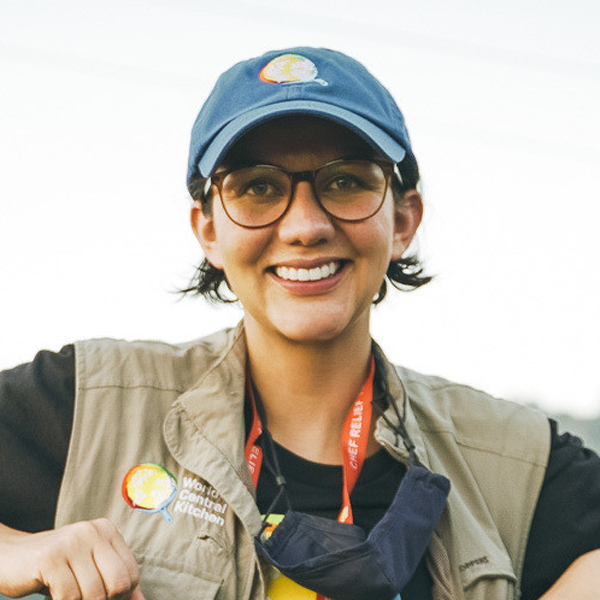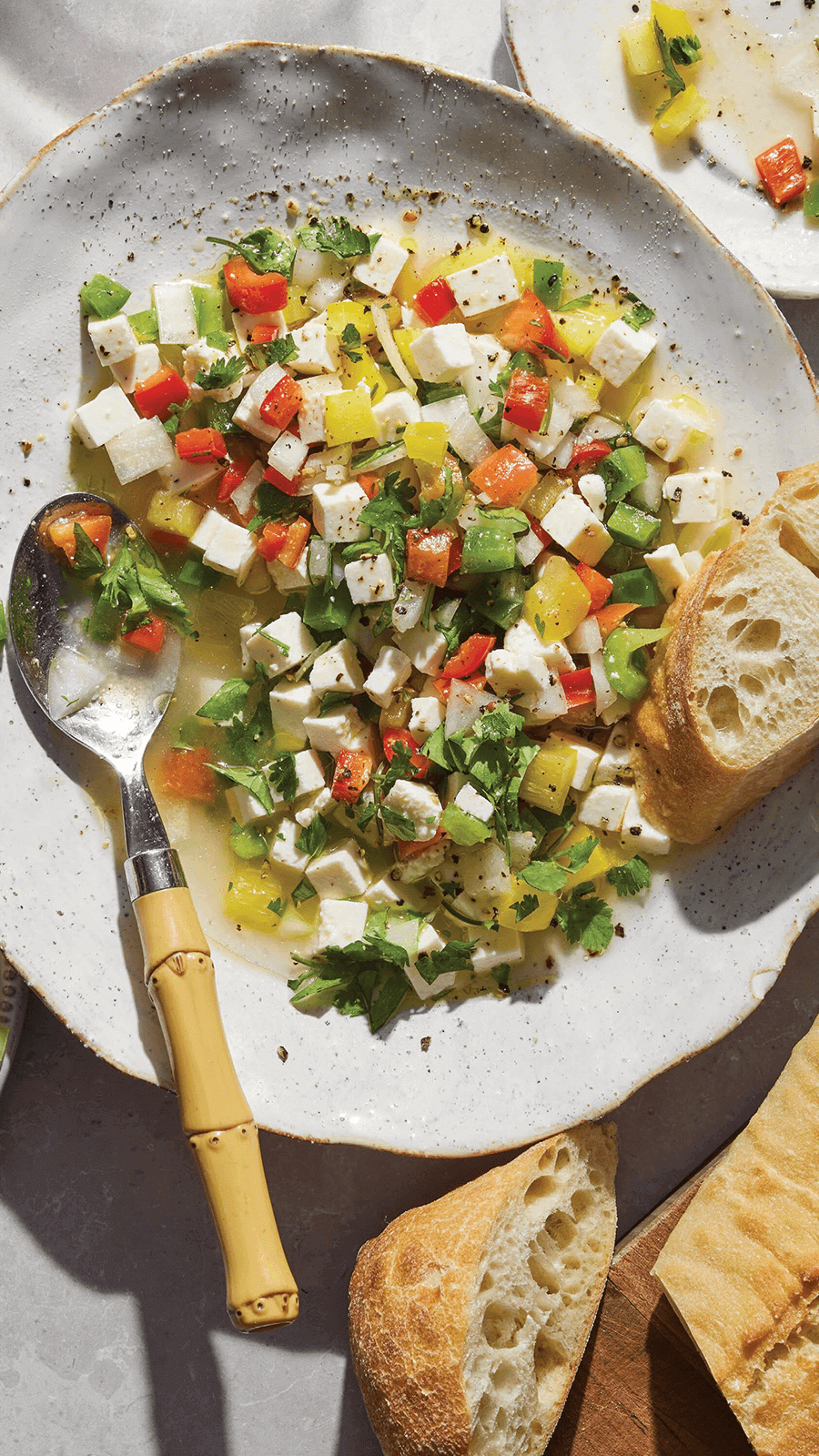Don't Miss Our Recent Livestream Events for Recipes, Tips & Seasonal FeaturesWatch Now >
|
Join The Ultimate Loyalty Experience®!Learn More >

Chef Fatima Castillo has not only mastered the art of making delicious and innovative food, but she also uses her training and talent to feed people at the epicenters of disasters and other humanitarian crises. Her meals nourish, comfort and fortify those who have endured the unimaginable. As an extension of her passion for the culinary—and her compassion for people—Fatima joined World Central Kitchen in 2018, where she is the Senior Manager of Operations for Latin America. Since then, she has led dozens of operations around the world, focusing both on the culinary and logistical elements of bringing meals to communities recovering from disasters.
In her position at WCK, Chef Fatima oversees all WCK relief efforts in the region, from meal distribution to community outreach to maintaining culinary standards. She brings her training from the acclaimed Academia Culinaria de Guatemala, as well as her experience as a professional pastry chef and executive chef with 13 years of nonprofit experience, to her work with WCK. (She was also the founder of ACD Guatemala—an organization providing educational and health services to youth and women in Guatemala.)
In her free time, Chef Fatima enjoys baking and traveling the world with her son, exploring and learning about other cultures together.
 Chef Fatima's Marinated Queso Fresco
Chef Fatima's Marinated Queso FrescoQ: What made you decide to pursue culinary arts?
Family was the primary influence. Growing up with a Palestinian and Iranian mother and grandmother and a Guatemalan father and grandmother, the traditions, recipes, and experience of sharing a meal with the family were deeply ingrained in me. That’s why sharing a plate of food has always been my passion. Whether it's with loved ones, family, friends, or those in need, I have always found joy in sharing meals. In fact, bonding with my son through food inspired me to learn more about culinary arts.
I have always been a travel junkie, too, exploring different cuisines and experiencing diverse food cultures. Learning about techniques and unique traditions in each country inspired me to become a part of the culinary world. Guatemala is a country that has a diverse food history and multicultural regions; I was eager to learn more about Guatemalan cuisine in culinary school. Culinary arts offered me a unique opportunity for creative expression and the ability to transform ingredients into beautiful dishes was incredibly fulfilling for me.
Q: How did you begin your work with World Central Kitchen?
After the 2018 eruption of Volcàn de Fuego in my home country of Guatemala, I started cooking for those who were displaced at my friend's restaurant. The day I cooked for the largest shelter, José Andrés found his way to us. As a chef, I had been following José’s career and the work of WCK, so it was truly an honor for me to volunteer for them and lead their operations in Escuintla for two months.
Q: In honor of Hispanic Heritage month, could you share some Hispanic chefs, restaurateurs and humanitarians that have inspired you?
My mother was also a chef and had the biggest heart. There’s also Manu Buffara. Her devotion to sustainability and quality ingredients stems from her commitment to the City of Curitiba, working with local communities to transform abandoned sites into urban gardens and educating locals on how to care for the gardens. Gabriela Camara, considered one of Mexico’s most influential chefs, is also an inspiration to me. She was selected for Mexico’s Council of Cultural Diplomacy in 2019 and advises the Mexican president on ways to ensure cleaner, safer and more sustainable food programs. And of course, there’s José Andrés who is the founder of World Central Kitchen.
Q: How does your Guatemalan heritage influence your personal culinary style?
Guatemalan cuisine is known for its unique flavor and ingredients, as well as its variety of dishes within the eight regions. I am inspired by traditional ingredients such as corn, chiles, and various herbs and spices. And most importantly, the coffee. My culinary style reflects my personal experiences traveling within Guatemala and the world. I can say that it’s a fusion of flavors from multiple cultures.
Q: What was the inspiration behind your recipes in the World Central Kitchen’s cookbook Feeding Humanity, Feeding Hope, including the one featured in The Fresh Market Magazine?
Some of the recipes in the book were developed by me, inspired by the emergency responses I’ve been involved in. I also take great pride in the inclusion of several Guatemalan recipes. For The Fresh Market, however, I wanted to provide a recipe that can easily be adapted by using locally sourced artisan cheese and fresh vegetables from your garden or farmer’s market. Thus, I chose a recipe from sisters and cheesemakers Glorimel Torrado and Carmen Rivera of De la Crema in Hatillo, Puerto Rico. WCK worked with them through our Food Producer Network–a program where we invested in local small businesses across the Caribbean to support sustainable food systems. This recipe incorporates fresh ingredients and is simple to prepare, making it perfect as a snack or appetizer for gatherings.
Q: How does your work with World Central Kitchen and as a chef honor Hispanic heritage?
As the relief senior manager for the Latin America region, I always prioritize the community. In our emergency responses, we promote traditional cuisine to make sure our recipients eat meals they are familiar with and find comforting. We also make sure the meals are prepared primarily by sourcing ingredients locally, respecting and preserving local traditions and techniques.
Q: What are some recommendations you have for those who want to get involved with helping to end hunger and food insecurity during Hunger Action Month?
Educate yourself and others. Learn about the causes and consequences of hunger and food insecurity, both globally and within your own community. Share this knowledge with others to raise awareness and inspire action. Encourage discussions, organize workshops, or give presentations to educate your community about the issue.
There are additional steps you can take. One is to reduce the food waste in your own life. This can include planning meals, properly storing food and composting. By minimizing waste, you help ensure that food resources are used efficiently and can be directed to those in need. Another is to support local farmers and food producers by purchasing their products. This helps strengthen local food systems and reduces dependence on long-distance food transportation or food imports. And lastly, support both local and international organizations working towards ending global hunger by participating in awareness campaigns, volunteering, or donating.
Q: As a Guatemalan chef, what are some staples in your kitchen?
Guatemalan coffee, chiles––my personal favorite is chili cobanero––spices such as cinnamon, achiote, pumpkin seeds, fresh fruit and vegetables from our local farmers market (Guatemala is known for its beautiful produce). And lastly, we make tortillas every day!
Q: Do you have any special projects or initiatives you are looking forward to with World Central Kitchen?
The cookbook has been a long-term project that I’m very proud of. To bring our story into home kitchens is a very special moment for WCK. I was very happy to be involved in recipe testing as well as contributing many recipes that highlight the work that WCK has done around Latin America and the world.


